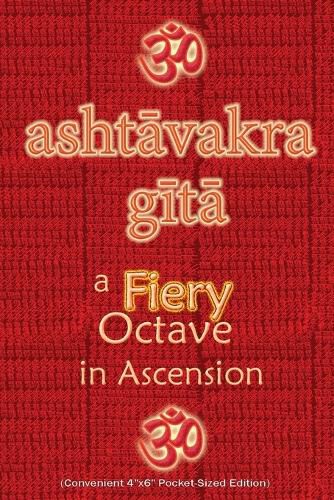Readings Newsletter
Become a Readings Member to make your shopping experience even easier.
Sign in or sign up for free!
You’re not far away from qualifying for FREE standard shipping within Australia
You’ve qualified for FREE standard shipping within Australia
The cart is loading…






This title is printed to order. This book may have been self-published. If so, we cannot guarantee the quality of the content. In the main most books will have gone through the editing process however some may not. We therefore suggest that you be aware of this before ordering this book. If in doubt check either the author or publisher’s details as we are unable to accept any returns unless they are faulty. Please contact us if you have any questions.
Covenient Pocket-Sized Edition 4 x6 . This Book is based on Ashtavakra Gita, the classic of Vedanta philosophy composed by Ashtavakra. Consolidating the highest flights of Vedic thoughts this work discusses the unity of the individual Self and the Supreme-Self through lucid, poetical language. It is presented as a dialogue between sage Ashtavakra and Janak, the king of Mithila.
The book discusses the nature of Self and Reality. According to Ashtavakra, Brahama (the Supreme-Self) is the only self-existent Reality; and the Self of all, at the very essence, is nothing but Brahama. Ashtavakra asserts that there exists a self-existent ever-enduring entity which persists as the eternal abiding substratum of the consciousness of egoism: the ‘I’ sense; and that is the Atma, our Self.
As opposed to Shankaracharya, Ashtavakra offers a more radical view on Vedanta. Ashtavakra insists on the absolute oneness of existence and complete unreality of external world. He does not seem to give much credence to morality and duties. He dismisses names and forms as unreal and signs of Ignorance. An ignorant person’s vision is shrouded by names and forms, but the wise one sees only the Self.
Acording to Ashtavakra we are already perfect and pure, unfettered and actionless, self-illuminated and taintless. We are not the mind – and the cause of our bondage is that we are still resorting to making that mind still. Besides the original Sanskrit text, transliteration and translation of the verses is provided.
$9.00 standard shipping within Australia
FREE standard shipping within Australia for orders over $100.00
Express & International shipping calculated at checkout
This title is printed to order. This book may have been self-published. If so, we cannot guarantee the quality of the content. In the main most books will have gone through the editing process however some may not. We therefore suggest that you be aware of this before ordering this book. If in doubt check either the author or publisher’s details as we are unable to accept any returns unless they are faulty. Please contact us if you have any questions.
Covenient Pocket-Sized Edition 4 x6 . This Book is based on Ashtavakra Gita, the classic of Vedanta philosophy composed by Ashtavakra. Consolidating the highest flights of Vedic thoughts this work discusses the unity of the individual Self and the Supreme-Self through lucid, poetical language. It is presented as a dialogue between sage Ashtavakra and Janak, the king of Mithila.
The book discusses the nature of Self and Reality. According to Ashtavakra, Brahama (the Supreme-Self) is the only self-existent Reality; and the Self of all, at the very essence, is nothing but Brahama. Ashtavakra asserts that there exists a self-existent ever-enduring entity which persists as the eternal abiding substratum of the consciousness of egoism: the ‘I’ sense; and that is the Atma, our Self.
As opposed to Shankaracharya, Ashtavakra offers a more radical view on Vedanta. Ashtavakra insists on the absolute oneness of existence and complete unreality of external world. He does not seem to give much credence to morality and duties. He dismisses names and forms as unreal and signs of Ignorance. An ignorant person’s vision is shrouded by names and forms, but the wise one sees only the Self.
Acording to Ashtavakra we are already perfect and pure, unfettered and actionless, self-illuminated and taintless. We are not the mind – and the cause of our bondage is that we are still resorting to making that mind still. Besides the original Sanskrit text, transliteration and translation of the verses is provided.